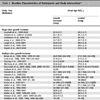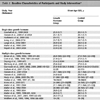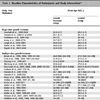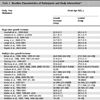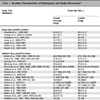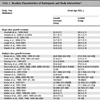- Home
- About Journals
-
Information for Authors/ReviewersEditorial Policies
Publication Fee
Publication Cycle - Process Flowchart
Online Manuscript Submission and Tracking System
Publishing Ethics and Rectitude
Authorship
Author Benefits
Reviewer Guidelines
Guest Editor Guidelines
Peer Review Workflow
Quick Track Option
Copyediting Services
Bentham Open Membership
Bentham Open Advisory Board
Archiving Policies
Fabricating and Stating False Information
Post Publication Discussions and Corrections
Editorial Management
Advertise With Us
Funding Agencies
Rate List
Kudos
General FAQs
Special Fee Waivers and Discounts
- Contact
- Help
- About Us
- Search

Afghan-Americans’ Understanding, Perception, and Commitment to Corporate Social Responsibility in Afghanistan: A Study Based Upon Gender, Generational Affiliation, and Leadership Experience
Belal A Kaifi*, Heesam Kang , Daniel Corcoran
Abstract
Numerous theoretical and empirical studies have investigated the phenomenon of corporate social responsibility in the West. Moreover, the notion of corporate social responsibility is becoming more prevalent in Afghanistan and other developing nations. The results of this study (N=230) reveal that Afghan-Americans have an overall high commitment to corporate social responsibility (CSR). More specifically, female Afghan-Americans have a higher commitment to corporate social responsibility than their male counterparts. Generation X Afghan-Americans have a higher commitment to corporate social responsibility than Generation Y Afghan-Americans. Afghan-Americans with at least five years of leadership experience have a higher commitment to corporate social responsibility than Afghan-Americans with less than five years of leadership experience. Suggestions and implications are explored for multi-national managers, political leaders, and United Nations officials working toward reconstruction and the peaceful development of Afghanistan.
Article Information
Identifiers and Pagination:
Year: 2015Volume: 1
Issue: Suppl 1: M3
First Page: 17
Last Page: 23
Publisher Id: ETHICS-1-17
DOI: 10.2174/2352633501501010017
Article History:
Received Date: 2/2/2015Revision Received Date: 9/3/2015
Acceptance Date: 11/3/2015
Electronic publication date: 30/4/2015
Collection year: 2015
open-access license: This is an open access article licensed under the terms of the Creative Commons Attribution Non-Commercial License (http://creativecommons.org/licenses/by-nc/3.0/) which permits unrestricted, non-commercial use, distribution and reproduction in any medium, provided the work is properly cited.
* Address correspondence to this author at the Trident University International, Cypress, CA 90630, United States; Tel: 1-800-375-9878; Ext: 2315; Fax: 925-526-5277; E-mail: belal.kaifi@trident.edu
| Open Peer Review Details | |||
|---|---|---|---|
| Manuscript submitted on 2-2-2015 |
Original Manuscript | Afghan-Americans’ Understanding, Perception, and Commitment to Corporate Social Responsibility in Afghanistan: A Study Based Upon Gender, Generational Affiliation, and Leadership Experience | |
INTRODUCTION
The history of Afghanistan (officially the Islamic Republic of Afghanistan) can be traced back to many cultures that have traveled throughout the country. Afghanistan’s strategic location (Central Asia) has always connected the rest of the world to Afghanistan, dating back to the Silk Road. According to Ewans [1], “Afghanistan has also over its long history been a highway of conquest between west, central and southern Asia” (p. 10). Different empires have traveled throughout Afghanistan, from China in the East to Italy in the West. Thus, Afghans have truly been exposed to the world of cultures and traditions. “Uniquely among the nations of Eurasia, Afghanistan has steadfastly resisted conquest, despite being a crossroads for ambitious empires throughout ancient and medieval times and a battleground in the modern age during the Great Game and Cold War” [2] (p. 26). Throughout Afghanistan, there are different traditions, languages, and even physical characteristics because of the different empires that have traveled throughout the country.
Prior to the Soviet invasion of Afghanistan in 1979, Afghans had worked out an elaborate system of unity, environmental care, social responsibility, and economic sustainability. Being an agrarian country and living off their own labors, traditional Afghans were self-sufficient, independent, and unaffected by the demands of a global economy. Over the years, the struggle for a unified Afghanistan has become an extremely complicated situation because of many complex reasons. One main reason is that Afghanistan is located in a strategic location in Central Asia which has caused many conflicts. Ewans [1] explains, “Although never colonized, Afghanistan is part of the colonial history of Tsarist Russia and British India.”(p. 9). The British attempted to colonize Afghanistan on three different occasions (i.e., 1839, 1878, and 1919) and were unsuccessful. Throughout the late 1970s and 1980s the Afghans were at war with the invading Russians, who were also defeated by the Afghan freedom fighters. In the 1990s, the Pakistani-backed Taliban occupied the majority of Afghanistan until 2001 when the US and its allies assisted the Afghan Northern Alliance with defeating the Pakistani-backed Taliban. Currently, the Taliban and Al Qaeda insurgents have been terrorizing the citizens of Afghanistan. No matter how powerful the force, Afghans have never surrendered to an outside invader.
Due to an unstable political climate, a significant amount of Afghans have fled Afghanistan and have started their lives in new societies; adapting to new cultures, languages, and traditions. More specifically, a large number of Afghans (≈100,000) have settled in the US. Over 30 years of non-stop war has left the country in complete chaos. Several generations of Afghan boys and girls have grown into adults knowing and seeing nothing but continuous war [3]. The election of the new Afghan President (i.e., Dr. Ashraf Ghani elected in September 2014) seems promising for most Afghans. The western media is notorious for being able to promote or undermine one's character. In 2013, the British Prospect Magazine claimed that Ashraf Ghani is the number two “top thinker” of the world [4] and according to America’s NY Times [5], he is the “the most educated and Westernized of Afghanistan candidates”. Years before his election, the western media was indirectly campaigning and promoting his character, credibility, and credentials. As a result, many Afghan-Americans are looking forward to returning to Afghanistan and assisting with the development process by initiating new businesses, corporations, and ventures. As a practical example, it has been reported that there are more than $1 trillion in mineral deposits within the borders of Afghanistan [6]. As a different example, cell phones (i.e., telecommunications industry) for women in Afghanistan will continue to be a lucrative market. According to Clark [7], “For women in emerging markets, cell phones can be life changing, offering banking services to free them from the dangers of carrying cash, texting when the communal water tap will open or sending instructions in prenatal care.” As a final example, the transportation industry will continue to be in demand due to the new and refurbished infrastructure in Afghanistan. For example, “the Zarang family began a simple motorcycle import business before deciding to assemble its own lines of three-wheeled rickshaws” [8]. Consequently, President Ashraf Ghani has an exceptional background in state-building and being a visionary leader. As an Anthropologist by trade, President Ghani of Afghanistan has held positions with the World Bank, United Nations, and several elite universities. According to the US Embassy of Afghanistan [9], “while working at the World Bank, President Ghani focused on articulating the Bank’s social policy and reviewing country strategies, conditionalities, and designing reform programs”. President Ashraf Ghani understands the impact and importance of social responsibility which is highlighted with the following three examples:
- While he was the Finance Minister of Afghanistan, he fired corrupt officials from the Finance Ministry, ignoring those who threatened to take revenge. He refused to pay the army until they produced a genuine roster of soldiers, rightly suspecting that the figures were exaggerated so as to claim extra money.
- During the Interim Administration, Dr. Ghani served, on a pro-bono basis, as Chief Adviser to Interim President Karzai and was among the first officials to disclose his own assets.
- While he was the Finance Minister of Afghanistan, Dr. Ghani harnessed his knowledge of the international system to break new ground in coordinating donor assistance. He required donors to keep their interventions to three sectors, thereby bringing clarity and mutual accountability to their relations with government counterparts, and preparing a development strategy that put the Afghans in the driver’s seat regarding accountability for their future.
As such, the broad research question for this research study is: Do Afghan-Americans have a commitment to corporate social responsibility in Afghanistan?
Most Afghans have spent at least three decades in America. Afghans have successfully built Islamic Centers, opened up restaurants, and other small businesses [10, 11]. With the emergence of a generation of Afghan children raised and educated in the United States, the Afghan-American community has proven to be a dynamic force with high-standards and goals. Afghans are focused on becoming successful by obtaining advanced degrees and adapting to the American culture while keeping their own traditions.
The first generation of Afghan-Americans who have grown up in California have been successful in pursuing their educational and entrepreneurial dreams. Afghans from all professions have started emerging. There are currently many Afghan medical doctors, engineers, attorneys, professors, police officers, and many who work in either the private or public sectors of the workforce. Most Afghans who reside in California would like to utilize their educational backgrounds to help in the development process of Afghanistan and are waiting for the right opportunities to return and assist. Many Afghans have also proven to be strong leaders in their professions [10].
SOCIAL RESPONSIBILITY AND CORPORATE SOCIAL RESPONSIBILITY
Many debates have taken place over the topic of social responsibility since the late 20th century. Initially, Bowen wrote an influential book in 1953 titled Social Responsibilities of the Businessman which delineated the importance of social responsibility [12]. Many believe that social responsibility is vital to the success or failure of a nation. More specifically, social responsibility is the process whereby people function as good citizens and are sensitive to their surroundings from a political, economical, environmental, technological, and social perspective. For example, a multinational corporation that pollutes the host country’s environment is not operating in a socially responsible manner. According to Knox and Maklan [13], “businesses are facing a number of challenges in their approach to corporate social responsibility. The argument that a firm has social responsibilities has been accepted” (p. 514). Over the years, many researchers have conducted studies on this indispensable topic. Some researchers explain [14], “Society and business, social issues management, public policy and business, stakeholder management, corporate accountability are just some of the terms used to describe the phenomena related to corporate responsibility in society”. As corporations, and organizations become more powerful both nationally and internationally, it is imperative for managers and leaders to take into consideration the impact of corporate social responsibility (CSR) on all aspects of a nation. The managers should not think CSR as an extra activity rather it should be considered as an actual way of doing business. “They should not consider it as an optional activity rather it should be part of management’s operations. The companies should also show in their balance sheets the amounts that they have spent on social obligations” [15]. This paradigm shift from focusing merely on profits to focusing on CSR for managers is a notion that should be addressed not only in management education but also in management training. “Tensions often exist in firms between commitments to social responsibility and commitments to maximize profits for shareholders”[16]. Other researchers have stated the following [17]:
“Whereas managers traditionally focused on the profit dimension, the new challenge is to integrate the social and ecological dimension in the strategy of the company. The social dimension includes a variety of aspects concerning the impact of company operations on human beings inside and outside the organization, such as good labor relations, health and safety, etc. The ecological dimension relates to the effects of company operations on the natural environment.” (p. 379)
A paradigm shift is needed for how CSR is perceived throughout the world and more specifically, in Afghanistan.
RESEARCH DESIGN
A 10-question survey was distributed to 300 Afghan-Americans at two different Islamic Centers in California to learn about their perception, understanding, and commitment to corporate social responsibility. The Afghan-Americans ranged in age, tribal affiliation, socio-economic status, work experience, and education level. All participants were at least 18 years of age and could comprehend, read, and write in English fluently. Of the 300 surveys that were completed, 70 were not completed correctly and/or were missing information. As a result, those 70 surveys were not used. Therefore, 230 surveys were successfully completed by 130 males and 100 females. This represents a 76% response rate. This small population sample can be used as a pilot study because of the convenience sampling method, which cannot be generalized to all Afghan-Americans. The specific hypotheses for this study are as follows:
Null Hypothesis 1: Both male and female Afghan-Americans will have the same scores as to corporate social responsibility in Afghanistan.
Null Hypothesis 2: Both Generation Y and Generation X Afghan-Americans will have the same scores as to corporate social responsibility in Afghanistan.
Null Hypothesis 3: Afghan-Americans with and without work experience will have the same scores as to corporate social responsibility in Afghanistan.
For the purpose of this study, corporate social responsibility is defined as a process with the aim to embrace responsibility for the company's actions and encourage a positive impact through its activities on the environment, consumers, employees, communities, stakeholders and all other members of the public sphere who may also be considered stakeholders. To the knowledge of the author, there are no other studies similar to this one. Below is an example of the survey directions, five out of the ten survey questions, and the 5-point likert-type scale, that was used for the 10-question corporate social responsibility survey developed by the author. The author created this survey to learn more about corporate social responsibility perceptions among different groups. A similar study was undertaken on undergraduate students enrolled in an International Business course to gauge their commitment to corporate social responsibility [18]. A score of 50 is the highest score one can receive and a score of 10 is the lowest score one can receive.
● Directions: The following statements will help you assess your commitment and understanding of corporate social responsibility.
Please use the following scale:
- To almost no extent
- To a slight extent
- To a moderate extent
- To a great extent
- To a very great extent
Furthermore, demographic questions were asked from each participant regarding: gender, generational affiliation, and work experience. These questions allowed the researcher to learn more about each participant’s background. For the purpose of this study, it is imperative to define certain terms/concepts. A millennial is an individual born after 1980. An individual born in between 1965 and 1980 is affiliated with Generation X. For the purpose of this study, leadership experience includes both formal and informal leadership experience. Table 1 summarizes the demographic questions:
STUDY RESULTS
For each hypothesis, an independent t-test was used to analyze the data. A total of 130 males and 100 females were surveyed (N=230). The first hypothesis states that both male and female Afghan-American will have the same scores as to corporate social responsibility. The results of this hypothesis are as follows: (t=5.516, p=0.001). As shown in Table 2, females have a significantly higher mean as to commitment to corporate social responsibility than their male counterparts. Thus, the null hypothesis is rejected.
The second hypothesis states that both Generation Y and Generation X Afghan-Americans will have the same scores as to corporate social responsibility. The results of this hypothesis are as follows: (t=5.476, p=0.001). As shown in Table 3, Generation X Afghan-Americans have significantly higher mean as to commitment to corporate social responsibility than Generation Y Afghan-Americans. Thus, the null hypothesis is rejected.
The third hypothesis states that Afghan-Americans with at least five years of leadership experience and Afghan-Americans with less than five years of leadership experience will have the same scores as to corporate social responsibility. The results of this hypothesis are as follows: (t= 8.686, p=0.001). As shown in Table 4, Afghan-Americans with at least five years of leadership experience have a significantly higher mean as to a commitment to corporate social responsibility than Afghan-Americans with less than five years of leadership experience. Thus, the null hypothesis is rejected.
DISCUSSION AND IMPLICATIONS
Most citizens have embraced CSR and progress has been made to enlighten all people about the importance of CSR. “CSR has come a long way from its early philanthropic roots, and has moved beyond the tipping point to become a wide-spread strategic business practice. Full CSR integration across the company is becoming the norm for large firms”[19] (p. 370). The main results of this study reveal three important factors for the future of Afghanistan:
a) Afghan-American females have a higher commitment to corporate social responsibility than their male counterparts.
b) Generation X Afghan-Americans have a higher commitment to corporate social responsibility than Generation Y Afghan-Americans.
c) Afghan-Americans with at least five years of leadership experience have a higher a commitment to corporate social responsibility than Afghan-Americans with less than five years of leadership experience.
All three of the results have one common denominator which is Islam. The participants of this research study are all Muslim and were surveyed at Islamic Centers. It should be mentioned that Islam addresses social responsibility in the Qur’an and also in the Sunnah. Overall, the results of this study show high levels of commitment to social responsibility and corporate social responsibility by Afghan-Americans. It is important to mention that Islam is not only a religion but a complete way of life [20]. According to Dusuki, “Islam affirms the role of reason and experience in theorizing economic behavior and business activities only in a way that embraces the transcendental aspect of human existence” [21]. Islam has taught Muslims the importance of charitable acts and social responsibility over 1,400 years ago. As such, Islamic scholars and leaders emphasize the importance of social responsibility during their sermons and lectures at Islamic Centers. Below are some examples of charitable acts that have been emphasized in the Qur’an and the Sunnah.
Therefore, it is important for Afghan leaders to discuss and highlight the teachings of Islam and provide trainings and practical examples for why social responsibility is imperative for the development of Afghanistan. As a practical example, an Afghan manager can remind his or her employees that during the month of Ramadhan, Muslims all over the world fast from sunrise until sunset—and one reason [of many] for this strenuous fast is to feel and empathize for those around the world who do not have food or water on a regular basis. Thus, being charitable, not wasting, being compassionate, and humility are essential principles of Islam that resonate with the workforce and social responsibility.
The results of this study show that Afghan-American females have a higher commitment to CSR than their male counterparts. As a high-context and collectivist people, this can be true because Afghan women are conditioned to be more concerned with their family, environment, surroundings, and community. Afghan women usually raise the children while Afghan men go to work. Afghan women understand that the nucleus of any society is family that is why the upbringing of children is so important and challenging. Afghan women teach their children at a very young age to be ethical, accountable, and respectful, all of which are linked to Islam and being socially responsible. Overall, Afghan women have an innate ability to be more caring and nurturing when compared to Afghan men [22, 23].
The results of this study show that Generation X Afghan-Americans have a higher commitment to corporate social responsibility than Generation Y Afghan-Americans. This can be true because of ethical maturity. Generation X Afghan-Americans are older and have most likely experienced more ethical dilemmas than their Generation Y counterparts which may explain why they have a better grasp of what being ethical is and how it can impact the society at large. Furthermore, it should be mentioned that most Generation X Afghan-Americans were most likely born in Afghanistan and most Generation Y Afghan-Americans were most likely born in the US because many families escaped Afghanistan in the early 80s. “Moscow’s ultimately unsuccessful 10-year war [1979-1989] in Afghanistan” resulted in many casualties and much embarrassment for the Russian’s who were defeated by “men on horseback” [2]. As such, the Afghan-Americans from Generation X may have had more exposure to Afghanistan and may have a stronger connection to their motherland. Lastly, Generation X Afghan-Americans most likely have higher levels of education and more work experience where they may have been exposed to concepts and ideas related to social responsibility.
The results of this study show that Afghan-Americans with at least five years of leadership experience have a higher commitment to corporate social responsibility than Afghan-Americans with less than five years of leadership experience. Only 105 out of 230 (approx. 45%) participants had at least five years of leadership experience. The Afghan-Americans with at least five years of leadership experience most likely had experience leading employees, teammates in sports, small businesses, or organizations. To be a successful leader, a person must have a vision, must be able to influence others, and must be able to transform their vision into action. Those with five or more years of leadership experience most likely have taken courses, read textbooks and religious books, participated in trainings, or discussed the importance of social responsibility with their peers.
As such, Afghan managers and leaders need to share their vision of CSR with their employees and followers to make sure that CSR is a priority for each and every organization. According to Knox and Maklan [13]:
“From a policy perspective, we propose that CSR leaders and other management need to build a consensus behind a CSR vision of what and to whom they wish to be responsible and how they wish to measure and report on their performance against the vision. That process will force senior management to consider their company’s unique competencies and determine how they can be leveraged to differing social and financial ends. Implementation of that vision through best practices requires measurement of stakeholder behaviors, more integrated risk management and formal assessment of social outcomes.” (p. 514)
Afghan managers and leaders must take action by transforming the way CSR is viewed in Afghanistan. This strenuous task can only be done with the help of Islamic leaders, teachers, and government officials. Furthermore, it is imperative for Afghan government officials to lead by example regarding all CSR efforts.
LIMITATIONS
There are several limitations to this study. Firstly, a larger sample size may have yielded different results. Next, a more diverse pool of participants (i.e., Afghan-Americans from different parts of the US) may have yielded different results. Consequently, additional information regarding work experience or actual leadership experience may have yielded interesting results. Future researchers should consider the above mentioned limitations when considering a similar study. One more limitation is the survey instrument that was used. This was a customized self-developed instrument which was used in only one other research study. In addition, future researchers should consider investigating the possible link between an individual’s religion and their commitment to corporate social responsibility. As such, a qualitative research study may yield useful results that can provide useful theory explaining why individuals have specific views toward social corporate responsibility and what influences those views. Moreover, future researchers may want to survey managers to derive a more valid conclusion.
CONCLUSION
“The Afghan workforce needs to be educated and trained so they can create a peaceful environment for themselves and effectively compete with their neighbors in the marketplace” [24]. With Afghan managers and organizations embracing the notion of corporate social responsibility, it becomes imperative to convey the importance of committing to corporate social responsibility to employees as soon as possible. “Awareness of the impact of business on society and environment has grown along with the growing socio-regulatory pressures” [13]. More specifically, employees should know the four main theories of corporate social responsibility by the time they graduate. Most of the current CSR theories are focused on four main aspects: (1) meeting objectives that produce long-term profits, (2) using business power in a responsible way, (3) integrating social demands and (4) contributing to a good society by doing what is ethically correct [14]. Afghan managers should consider formulating and implementing a worldwide corporate social responsibility policy that will benefit all. According to Townsley and Stohl [25], “Although a global economy might conjure a desire for a worldwide CSR policy, a retreat to universalism appears in vain. A disembedding of local relationships and the emergence of new global alignments, actors, and discourses of responsibility apart from particular location are as problematic as suggesting cultural relativism as the solution for creating a global workplace of joint responsibility and collective good” (p. 604). Furthermore, there are both extrinsic and intrinsic values to embracing corporate social responsibility. Some researchers explain [17] that:
“The financial motive is an extrinsic motive of CSR. It encourages CSR because it has instrumental value for profit or income. Non-financial motives often reflect intrinsic motives that perceive CSR as an end in itself, independent from (financial) benefits. We distinguish two types of intrinsic motives: CSR as moral duty and CSR as an expression of altruism. The moral duty to be socially responsible can be derived from ethical principles of moral philosophy or from religious principles. This means that one feels obliged to do something not because it is enjoyable but it is right. These moral or religious duties require an effort people might not undertake unless these acts prescribed by morality or religion [17]” (p. 380).
By embracing CSR, Afghanistan can become a role model for other nations to follow. This research study contributes to the much needed discussion on the role of CSR in Afghanistan. More specifically, Afghan leaders can utilize the concepts and principles of Islam to help the Afghan people understand the importance of CSR.
ABOUT AUTHORS
Belal A. Kaifi completed a post-doctoral program in Business Administration with an emphasis in Management and Marketing at the University of Florida. Dr. Kaifi completed his doctoral degree in Organization and Leadership at the University of San Francisco. He is currently a Fulbright Scholar Specialist which is sponsored by the United States Department of State, Bureau of Educational and Cultural Affairs. Dr. Kaifi has over 50 publications since 2008. Belal can be reached at: belal.kaifi@trident.edu
Heesam Kang completed his doctoral degree in Finance at the University of Texas at Arlington. Dr. Kang is interested in financial derivatives and business consulting as research topics. Dr. Kang is a member of the Washington Society of Certified Public Accountants. Heesam can be reached at: heesam.kang@trident.edu
Dan Corcoran completed his doctoral work at Touro University International and has published in the fields of occupational safety and health management and corporate social responsibility. Prior to entering academia he worked as an administrator for the US Department of Labor, Occupational Safety and Health Administration. He holds two professional certifications in the field of occupational safety and health. Dan can be reached at: daniel.corcoran@trident.edu
CONFLICT OF INTEREST
The authors confirm that this article content has no conflict of interest.
ACKNOWLEDGEMENTS
Declared none.

